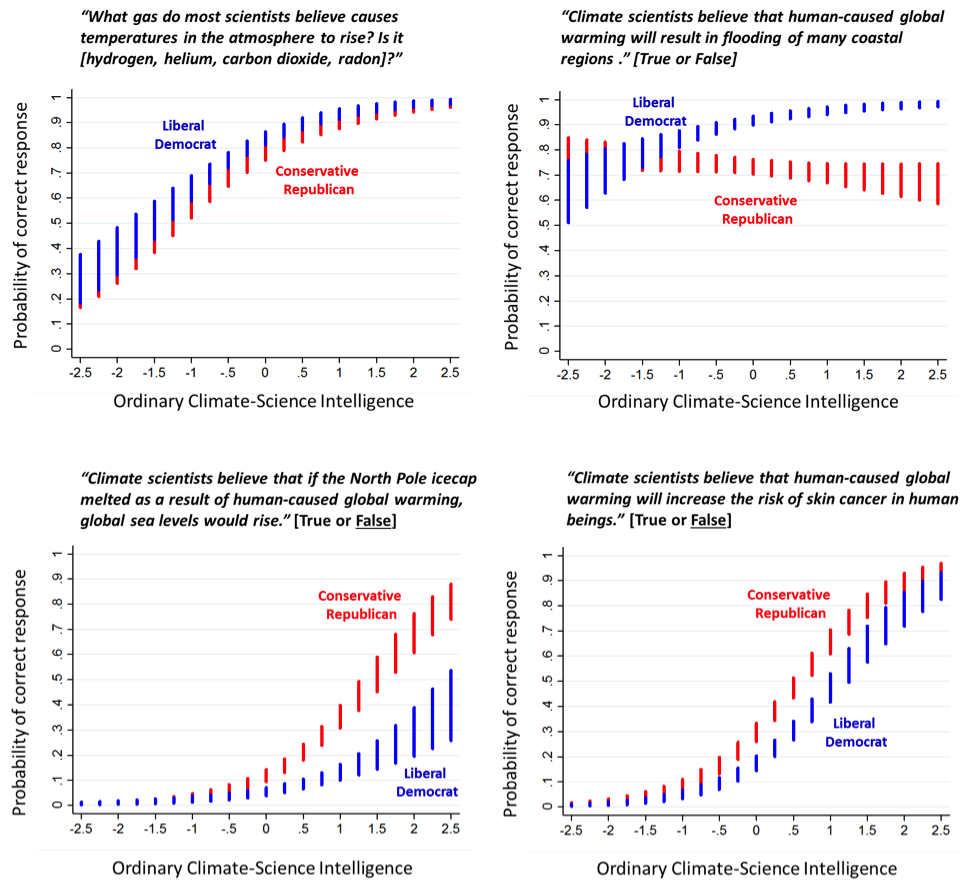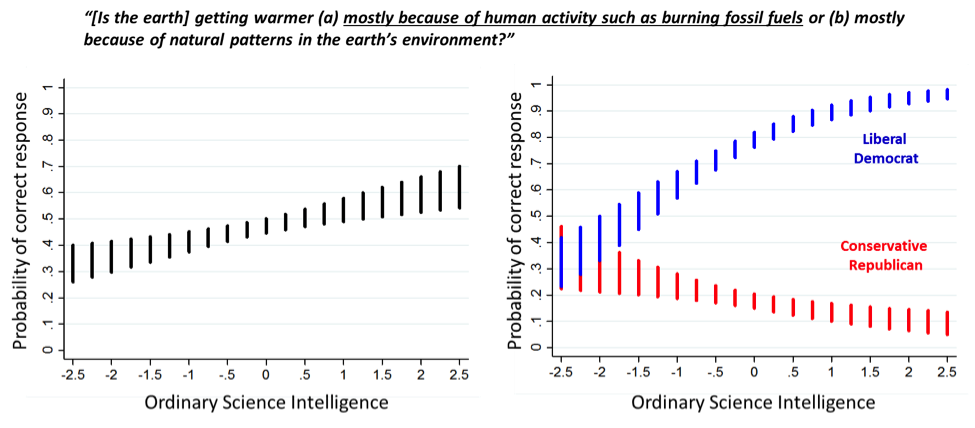批判サイド>否定論・陰謀論を信じる理由
以前から、地球温暖化についての世論は民主党支持・リベラルと、共和党支持・保守の間に大きな乖離があることがわかっていた。それを一歩踏み込んで調べたKahan[2014]をChris Mooneyが紹介している。
保守が科学知識が足りないのではないことを、Kahanは質問のワーディング「科学者は・・・と信じている」とすることで示している。
保守な人は、科学ついての知識があるほど、「科学者は地球温暖化の要因として人間活動を挙げている」ことを知っていながら、自分はそうは考えないという党派性を示している。
Kahan教授自身も一般向けに記事も書いていて...
以前から、地球温暖化についての世論は民主党支持・リベラルと、共和党支持・保守の間に大きな乖離があることがわかっていた。それを一歩踏み込んで調べたKahan[2014]をChris Mooneyが紹介している。
"Whether people 'believe in' climate change, like whether they 'believe in' evolution, expresses who they are," writes Kahan. To understand Kahan's analysis, it helps to start where much of his prior research―extensively covered by Klein, myself, and others―left off. Kahan has defined a measure that he calls "ordinary science intelligence," which assesses how good people are at mathematical and scientific reasoning and at questioning their own beliefs. Using this survey tool, he is able to present evidence showing that (1) as people get better at science, they are more likely in general to affirm that global warming is mostly due to human activities; but (2) as soon as you split people up in to liberals and conservatives, that conclusion goes out the window. Actually, liberals get way better in their answers as their science ability increases, and conservatives get considerably worse:
「人々が気候変動を『信じる』かは、進化論を『信じる」かと同様に、自分が何者であるかを表現している」とKahanは言う。Kahan(2014)の分析を理解するには、彼の前の研究から始めた方がいいだろう。Kleinや私自身や他はおいておこう。Kahanは一般科学知識水準と呼ぶ指標を定めた。これは、数学及び科学推論の能力を評価するもので、人々自身の信条を問うときに調べる。この調査道具を使うことで、彼は (1) 科学が得意であるほど、地球温暖化が主として人間活動によるものだと確信していて、(2) リベラルと保守に分割すると、結論はそうではなくなることを示す証拠を提示できた。実際、リベラルは科学の能力が高いほど正答率が高く、保守では正答率が低くなる。

[ Chris Mooney: "Conservatives Don't Deny Climate Science Because They're Ignorant. They Deny It Because of Who They Are." ]
保守が科学知識が足りないのではないことを、Kahanは質問のワーディング「科学者は・・・と信じている」とすることで示している。
Next, Kahan examined the patterns of responses based on ideology. This time, though, he no longer saw a performance split between those on the left and those on the right. Nor did he see a uniform pattern in which liberals tended to be more correct with higher levels of intelligence or science literacy, even as conservatives were more incorrect. Rather, sometimes the two groups were nearly the same in their performance, and sometimes one group did a little better or a little worse than the other:
次に、Kahanはイデオロギーに基づく回答パターンを調べた。このときは、しかし、レフトとライトの成績の差は見られなかった。知性が高いほど、あるいは科学知識が多いほど、リベラルでは正解が多く、保守では正解が少ないというパターンも見られなかった。むしろ、成績は違わないか、場合により保守が少し良かったり悪かったりだった。

[ Chris Mooney: "Conservatives Don't Deny Climate Science Because They're Ignorant. They Deny It Because of Who They Are." ]
保守な人は、科学ついての知識があるほど、「科学者は地球温暖化の要因として人間活動を挙げている」ことを知っていながら、自分はそうは考えないという党派性を示している。
Kahan教授自身も一般向けに記事も書いていて...
What people “believe” about evolution likewise has zero correlation with what people know about the scientific evidence on the natural history of human beings or about any other insight human beings have acquired by use of science’s signature methods of observation, measurement, and inference. “Belief” and “disbelief,” too, are expressions of identity.これは収入・学歴・性別・人種・宗教よりも世論は党派性に影響される時代の現実でもある。
But precisely because that’s what they are−precisely b/c free and reasoning people predictably, understandably use their reason to form and persist in positions that advance their stake in maintaining bonds with others who share their outlooks−the teaching of evolution is fraught. I’m not talking about the politics of teaching evolution; that’s fraught, too, of course. I’m talking about the challenge that a high school or college instructor faces in trying to make it possible for students who live in a world where positions on evolution express who they are to actually acquire knowledge and understanding of what it is science knows about the natural history of our species.
同様に人々が進化論ついて何を「信じている」かは、人類の自然史についての科学的証拠や、観測・計測・推論という科学の方法を使って獲得した人類の洞察についての知識と何の相関もない。「信じる」か「信じない」かは、アイデンティティの表明でもある。
しかし、正確には彼らが何者であるかが故に、すなわち、「自由で論理的な人々は、予想通り、理解できるように、彼らの論理を使って、見解を共有する人々との紐帯を維持する利害関係を進展させる立場を形成・維持する」が故に、進化論教育は困難なものとなっている。私は進化論教育の政治について語っているのではない。それもまた、困難な問題だが。私は、「進化論についての立場が、自らが何もであるかの表明となっている世界」にいる学生たちに、「実際に、人類の自然史について科学が知っていることついての知識と理解を獲得させること」に直面している、高校教師や大学講師の課題について語っている。
To their immense credit, science education researchers have used empirical methods to address this challenge. What they’ve discovered is that a student’s “disbelief” in evolution in fact poses no barrier whatsoever to his or her learning of how random mutation and genetic variance combine with natural selection to propel adaptive changes in the forms of living creatures, including humans.
After mastering this material, the students who said they “disbelieved” still say they “disbelieve” in evolution. That’s because what people say in response to the “do you believe in evolution” question doesn’t measure what they know; it measures who they are.
Indeed, the key to enabling disbelievers to learn the modern synthesis, this research shows, is to disentangle those two things−to make it plain to students that the point of the instruction isn’t to make them change their “beliefs but to impart knowledge; isn’t to make them into some other kind of person but to give them evidence along with the power of critical discernment essential to make of it what they will.
科学教育学研究者は、この課題に対処するために経験的方法を使用して成果を出している。彼らが発見したことは、進化論を「信じない」学生たちが、「いかにランダムな突然変異と遺伝分散と自然選択の組み合わせが、生物形態の適応的変化を推進する」かを学ぶことに、いかなる障壁も持っていないことである。
教科をマスターした後も、進化論を「信じない」学生たちは、やはり、進化論を「信じない」と回答する。これはもちろん、「進化論を信じるか」という問いに対する回答が、彼らが知っていることを計測していないからである。そうではなく、彼らが何者であるかを問うているからである。
確かに、進化論を信じない学生たちが現代総合進化論の学習できるようになるキーは、この研究が示すように、2つおことを分離することになる。すなわち、「授業のポイントが学生たちの信条を変えることではなく、知識の付与である」ことを学生たちにわからせること。「学生たちを別種の人間に仕立てること」ではなく、「学生たちの意志を作るために不可欠な重要な見解とともに証拠を与える」ことにある点を。
[ Dan Kahan: "Why the science of science communication needs to go back to highschool (& college; punctuated with visits to museum & science film-making studio)" (2014/09/29) 0n The Cultural Cognition Project at Yale Law School ]


コメントをかく